 W
WPrince Heinrich Wilhelm Adalbert of Prussia was a son of Prince Wilhelm of Prussia and Landgravine Marie Anna of Hesse-Homburg. He was a naval theorist and admiral. He was instrumental during the Revolutions of 1848 in founding the first unified German fleet, the Reichsflotte. During the 1850s he helped to establish the Prussian Navy.
 W
WAlbert was the King of Saxony and a member of the House of Wettin.
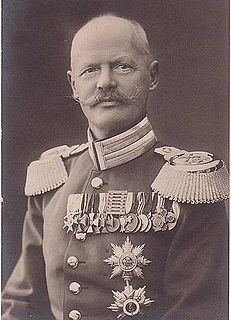 W
WPrince Arnulf of Bavaria was a member of the Bavarian Royal House of Wittelsbach and a General of Infantry.
 W
WTheobald Theodor Friedrich Alfred von Bethmann Hollweg was a German politician who was the chancellor of the German Empire from 1909 to 1917.
 W
WHans Alexis von Biehler - was a Prussian general. He designed fortifications in many famous locations. Beginning in 1873, he saw fort construction in Cologne, Strasbourg, Poznań, Toruń, Königsberg, Ingolstadt, Metz, Kostrzyn, Spandau, Ulm, Mainz and Magdeburg.
 W
WMax von Bock und Polach was a Prussian officer and Field Marshal. He served in the military during the three wars of German unification under the leadership of Prime Minister Otto von Bismarck.
 W
WEduard Freiherr von Böhm-Ermolli was an Austrian general during World War I who rose to the rank of field marshal in the Austro-Hungarian Army. He was the head of the Second Army and fought mainly on the front of Galicia during the entire conflict. On 30 October 1940, Böhm-Ermolli was made a German Generalfeldmarschall.
 W
WFelix Ludwig Graf von Bothmer was a German general from Bavaria, notably during the Brusilov offensive of 1916.
 W
WWalther Franz Georg Bronsart von Schellendorff, Dr. jur. h.c., was a Prussian General of the Infantry à la suite, Adjutant-General to the Kaiser and King, and Prussian Minister of War.
 W
WKarl Wilhelm Paul von Bülow was a German field marshal commanding the German 2nd Army during World War I from 1914 to 1915.
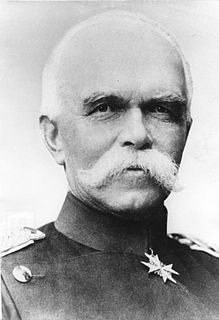 W
WGeorg Leo Graf von Caprivi de Caprera de Montecuccoli, born Georg Leo von Caprivi, was a German general and statesman who served as the chancellor of the German Empire from March 1890 to October 1894. Caprivi promoted industrial and commercial development, and concluded numerous bilateral treaties for reduction of tariff barriers. However, this movement toward free trade angered the conservative agrarian interests, especially the Junkers. He promised the Catholic Center party educational reforms that would increase their influence, but failed to deliver. As part of Kaiser Wilhelm's "new course" in foreign policy, Caprivi abandoned Bismarck's military, economic, and ideological cooperation with the Russian Empire, but was unable to forge a close relationship with the United Kingdom. He successfully promoted the reorganization of the German military.
 W
WFranz Xaver Josef Conrad von Hötzendorf, sometimes anglicised as Hoetzendorf, was an Austrian general who played a central role in World War I. He served as K.u.k. Feldmarschall and Chief of the General Staff of the military of the Austro-Hungarian Army and Navy from 1906 to 1917. He was in charge during the July Crisis of 1914 that caused World War I. For years he had repeatedly called for preemptive war against Serbia to rescue the multiethnic Habsburg Empire, which was, he believed, nearing disintegration. Later on, he came to believe that the Dual Monarchy had taken action at the eleventh hour. The Army was also unprepared and he had resorted to politics to further his goals. He was unaware that Germany would relocate the majority of his forces to the East, rather than in the Balkans. Conrad was anxious about invading Russia and when the Tsar's armies had captured the Carpathian mountain passes and were on the verge of invading Hungary, Italy entered the war on the side of the Allies. Nevertheless, the Austro-Germans cleared Galicia and Poland during the Gorlice–Tarnów Offensive in the summer of 1915 and later conquered Serbia in October. From 1915 his troops were increasingly reliant on German support and command. Without support from its German allies the Austro-Hungarian Army was an exhausted force. In March 1917, Charles I of Austria dismissed him as Chief of Staff after Emperor Franz Joseph died and Conrad's Trentino Offensive had failed to achieve its objective; he then commanded an army group on the Italian Front until he retired in the summer of 1918. He died in 1925.
 W
WGeneral Erich Georg Sebastian Anton von Falkenhayn was the second Chief of the German General Staff of the First World War from September 1914 until 29 August 1916. He was removed on 29 August 1916 after the failure at the Battle of Verdun, the opening of the Battle of the Somme, the Brusilov Offensive and the entry of Romania into the war on the Allied side undid his strategy to end the war before 1917. He was later given important field commands in Romania and Syria. His reputation as a war leader was attacked in Germany during and after the war, especially by the faction which supported Paul von Hindenburg. Falkenhayn held that Germany could not win the war by a decisive battle but would have to reach a compromise peace; his enemies said he lacked the resolve necessary to win a decisive victory. Falkenhayn's relations with the Chancellor Theobald von Bethmann-Hollweg were troubled and undercut Falkenhayn's plans.
 W
WFriedrich Freiherr von Georgi was a General of the Austro-Hungarian Army.
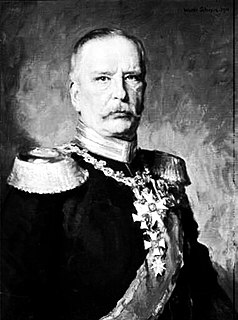 W
WHeinrich Wilhelm Martin von Goßler was a Prussian General of the Infantry and Minister of War. He was a Knight of Justice (Rechtsritter) of the Order of Saint John.
 W
WGottlieb Ferdinand Albert Alexis Graf von Haeseler was a German military officer of the Imperial Wilhelmine period, with final rank of Generalfeldmarschall.
 W
WWilhelm Gustav Karl Bernhard von Hahnke was a Prussian Field Marshal, and Chief of the German Imperial Military Cabinet from 1888 to 1901.
 W
WJakob Freiherr von Hartmann was a Bavarian general who served in the Austro-Prussian War and Franco-Prussian War.
 W
WLeopold Freiherr von Hauer was a Colonel General in the Austro-Hungarian Army. He participated in the First World War on the Russian front.
 W
WBaron Samu Hazai was a Hungarian military officer and politician of Jewish origin, who served as Minister of Defence of Hungary between 1910 and 1917.
 W
WDietrich Graf (Count) von Hülsen-Haeseler was an infantry general of the German Empire.
 W
WGustav Heinrich Ernst Friedrich von Ingenohl was a German admiral from Neuwied best known for his command of the German High Seas Fleet at the beginning of World War I.
 W
WPrince Karl Theodor Maximilian August of Bavaria ; and grand prior of the order of Malta, was a German soldier.
 W
WGustav Emil Bernhard Bodo von Kessel was a German general who served in the Austro-Prussian War, the Franco-Prussian War and World War I.
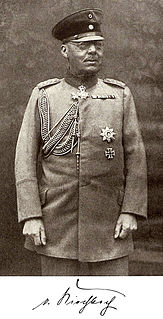 W
WRudolph Bodo Hans von Kirchbach was a Royal Saxon army officer who was a Generaloberst in the First World War and awarded the Pour le Mérite.
 W
WErnst Wilhelm Eduard von Knorr was a German admiral of the Kaiserliche Marine who helped establish the German colonial empire.
 W
WHans Ludwig Raimund von Koester was a German naval officer who served in the Prussian Navy and later in the Imperial German Navy. He retired as a Grand Admiral.
 W
WLeopold Maximilian Joseph Maria Arnulf, Prinz von Bayern was born in Munich, the son of Prince Regent Luitpold of Bavaria (1821–1912) and his wife Archduchess Augusta of Austria (1825–1864). He was a Field Marshal (Generalfeldmarschall) who commanded German and Austro-Hungarian forces on the Eastern Front in World War I.
 W
WEwald Constantin Ferdinand Friedrich von Lochow was a Prussian officer and later General of Infantry during World War I. He was a recipient of Pour le Mérite with Oakleaves.
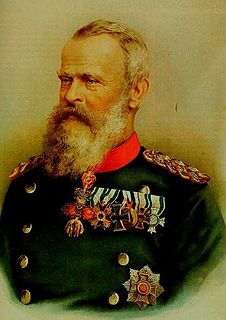 W
WLuitpold Karl Joseph Wilhelm Ludwig, Prince Regent of Bavaria, was the de facto ruler of Bavaria from 1886 to 1912, due to the incapacity of his nephews, King Ludwig II for three days and King Otto for 26 years.
 W
WEdwin Karl Rochus Freiherr von Manteuffel was a Prussian Generalfeldmarschall noted for his victories in the Franco-Prussian War.
 W
WGraf Helmuth Johannes Ludwig von Moltke, also known as Moltke the Younger, was a German general and Chief of the Great German General Staff. He was also the nephew of Generalfeldmarschall Helmuth Karl Bernhard von Moltke who is commonly called "Moltke the Elder" to differentiate the two.
 W
WGeorg Alexander von Müller was an Admiral of the Imperial German Navy and a close friend of the Kaiser in the run up to the First World War.
 W
WAlexander August Wilhelm von Pape was a Royal Prussian infantry Colonel-General with the special rank of Generalfeldmarschall.
 W
WHans Georg Hermann von Plessen was a Prussian Colonel General and Canon of Brandenburg who held the honorary rank of Generalfeldmarschall in his role as Commandant of the German General Staff during World War I.
 W
WAlbrecht Theodor Emil Graf von Roon was a Prussian soldier and statesman. As Minister of War from 1859 to 1873, Roon, along with Otto von Bismarck and Helmuth von Moltke, was a dominating figure in Prussia's government during the key decade of the 1860s, when a series of successful wars against Denmark, Austria and France led to German unification under Prussia's leadership. A moderate conservative and supporter of executive monarchy, he was an avid modernizer who worked to improve the efficiency of the army.
 W
WRupprecht, Crown Prince of Bavaria, Duke of Bavaria, Franconia and in Swabia, Count Palatine by (the) Rhine, was the last heir apparent to the Bavarian throne. During the first half of the First World War he commanded the 6th Army on the Western Front. From August 1916, he commanded Army Group Rupprecht of Bavaria, which occupied the sector of the front opposite the British Expeditionary Force.
 W
WCarl Friedrich Heinrich Reinhard Scheer was an Admiral in the Imperial German Navy. Scheer joined the navy in 1879 as an officer cadet and progressed through the ranks, commanding cruisers and battleships, as well as senior staff positions on land. At the outbreak of World War I, Scheer was the commander of the II Battle Squadron of the High Seas Fleet. He then took command of the III Battle Squadron, which consisted of the newest and most powerful battleships in the navy. In January 1916, he was promoted to Admiral and given control of the High Seas Fleet. Scheer led the German fleet at the Battle of Jutland on 31 May – 1 June 1916, one of the largest naval battles in history.
 W
WAlfred Graf von Schlieffen, generally called Count Schlieffen, was a German field marshal and strategist who served as chief of the Imperial German General Staff from 1891 to 1906. His name lived on in the 1905–06 "Schlieffen Plan", then Aufmarsch I, a deployment plan and operational guide for a decisive initial offensive operation/campaign in a two-front war against the French Third Republic.
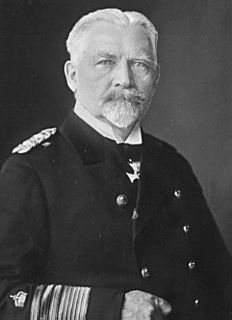 W
WLudwig von Schröder was a member of the German nobility and an Imperial German Navy officer and Admiral during the First World War and a recipient of the Pour le Mérite with Oak Leaves. Schröder entered the newly established Imperial Naval Service in May 1871. Prior to World War I, he served on several different ships and commanded the Blitz, as well as the training vessel the Moltke. He additionally functioned as the Chief of the Cruiser-Class Division in the West Indies. Von Schröder retired from active duty in 1913. One of his final assignments was as the commander of Marinestation der Ostsee.
 W
WRudolf Freiherr Stöger-Steiner von Steinstätten was a colonel general in the Austro-Hungarian army and served as the last Imperial Minister for War not only to the Austro-Hungarian Empire but also to the ancient Habsburg monarchy which sat at its head.
 W
WHermann Christian Wilhelm von Strantz was a Prussian officer, and later General of Infantry during World War I. He was a recipient of Pour le Mérite.
 W
WLudwig Samson Heinrich Arthur Freiherr von und zu der Tann-Rathsamhausen was a Bavarian general.
 W
WAlfred Peter Friedrich von Tirpitz was a German grand admiral, Secretary of State of the German Imperial Naval Office, the powerful administrative branch of the German Imperial Navy from 1897 until 1916. Prussia never had a major navy, nor did the other German states before the German Empire was formed in 1871. Tirpitz took the modest Imperial Navy and, starting in the 1890s, turned it into a world-class force that could threaten Britain's Royal Navy. However, during World War I, his High Seas Fleet proved unable to end Britain's command of the sea and its chokehold on Germany's economy. The one great engagement at sea, the Battle of Jutland, ended in a narrow German tactical victory but a strategic failure. As the High Seas Fleet's limitations became increasingly apparent during the war, Tirpitz became an outspoken advocate for unrestricted submarine warfare, a policy which would ultimately bring Germany into conflict with the United States. By the beginning of 1916, he was dismissed from office and never regained power.
 W
WAlfred Ludwig Heinrich Karl Graf von Waldersee was a German field marshal (Generalfeldmarschall) who became Chief of the Imperial German General Staff.
 W
WOskar Ritter und Edler von Xylander was a Bavarian General der Infanterie, at last commanding the I Royal Bavarian Corps until his retirement in 1918.